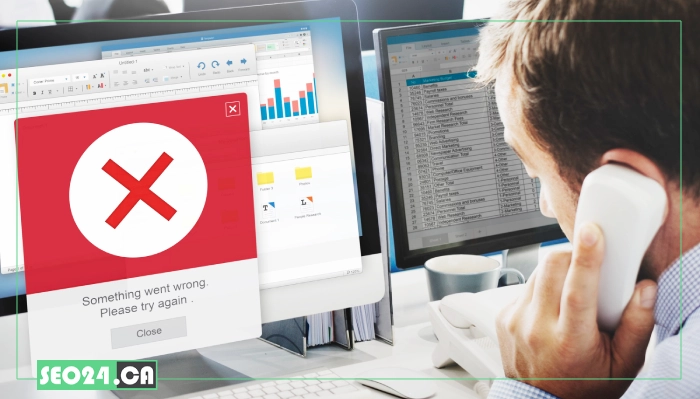
Page not Ranking
You’ve done everything by the book. Your content is optimized, your keywords are on point, and your on-page SEO checklist is complete. So why isn’t your page ranking?
If you’ve ever asked yourself “Why your Optimized Page won’t Rank,” you should know the answer isn’t always obvious. Sometimes, the problem isn’t what you’ve done—but what you’ve missed. From weak backlinks to hidden technical issues or user experience flaws, there are many invisible walls blocking your page from climbing the SERPs.
Here’s the hard truth: Optimization alone isn’t enough anymore. In this guide, we’ll break down the real reasons your page might be stuck—and how to fix them, one by one.
Table of Contents
Content Quality and Relevance
When optimizing a page, content quality and relevance are key factors that determine how well your page ranks. Even if you follow every SEO guideline, your page might not perform well if the content doesn’t meet search intent or lacks value. Here’s why:
Not Targeting the Right Keywords (or Not Targeting Them Well Enough)
Effective keyword targeting is a cornerstone of SEO. If your content doesn’t focus on the right keywords, or if you aren’t using them strategically, your page won’t rank. Proper research and placement of primary and secondary keywords help search engines understand what your page is about and match it with users’ queries.
Your Content Doesn’t Answer the Search Query (or Isn’t Comprehensive Enough)
Search engines prioritize content that directly answers user queries. If your page doesn’t thoroughly address the problem or question the user is seeking, even the most optimized page might struggle to rank. Make sure your content is comprehensive, well-researched, and covers every aspect of the query to improve your chances of ranking.
Your Content Lacks Originality and Value
Originality is crucial in content creation. If your content is just rehashed information from other sites, it won’t stand out to search engines or users. Adding unique insights, fresh perspectives, or in-depth analysis gives your page more value, helping it rank higher.
Thin Content: Not Enough Substance
Content that lacks depth—often referred to as “thin content”—won’t rank well. Pages with little to no substance provide minimal value to users and are often dismissed by search engines. To rank well, your content needs to be detailed, informative, and rich in quality.
Building Authority and Trust
Building authority and trust is a critical component of SEO that directly influences whether your page will rank well. If your site is not perceived as trustworthy or authoritative, even well-optimized content may struggle to reach its full potential. Here’s why:
Lack of High-Quality Backlinks
Backlinks are a major ranking factor for search engines. Without high-quality backlinks from reputable sites, it can be difficult for your content to gain the authority it needs to rank. Backlinks act as a vote of confidence for your content, signaling to search engines that your page is reliable and valuable. The absence of strong backlinks is a key reason for why your optimized page won’t rank.
Lack of E-A-T (Expertise, Authoritativeness, Trustworthiness)
E-A-T is a concept that Google uses to assess the quality of a website. If your site lacks clear indicators of expertise, authoritativeness, or trustworthiness, it can negatively impact your rankings. Ensuring that your content is written by experts in the field, is sourced from reliable references, and conveys trust is essential for building a strong online presence and boosting your rankings.
Not Optimizing for Topical Authority
Topical authority is another important factor for ranking. Focusing on a specific niche and consistently creating high-quality content around that topic helps establish your website as an authority on that subject. If your content is too broad or lacks a consistent focus, it may not be seen as a reliable source for a given topic, preventing you from ranking well.
Technical SEO Issues Hindering Visibility
Even the best content won’t rank if technical SEO issues are blocking search engines from properly crawling or indexing your site. Here are the most common technical pitfalls that could be hurting your visibility:
Indexation Problems: Google Can’t Find or Crawl Your Content
If Google can’t crawl or index your pages, they won’t appear in search results—no matter how optimized they are. Issues like incorrect robots.txt rules, noindex tags, or broken internal links can prevent important content from being discovered.
Poor Website Structure and Navigation
Search engines rely on logical site structures to understand and rank your content. Disorganized navigation, orphan pages, or deep nesting can confuse both users and crawlers, weakening your site’s SEO performance.
Website Speed and Performance
Slow-loading pages lead to higher bounce rates and poor user experience—both of which negatively affect rankings. Optimize images, use caching, and minimize code to boost speed across your site.
Mobile-Friendliness (and Mobile-First Indexing)
With mobile-first indexing, Google primarily uses the mobile version of your site for ranking. If your site isn’t mobile-friendly, it could seriously hurt your visibility. Use responsive design and test your site regularly on different devices.
Technical SEO Best Practices
To maintain strong technical SEO, ensure you:
- Use schema markup for enhanced search appearance
- Optimize your robots.txt and sitemap
- Manage redirects correctly to avoid loops or broken paths
- Secure your site with HTTPS
If you’re serious about fixing technical SEO issues and improving rankings, consider professional help. Check out SEO in Toronto for expert strategies and hands-on optimization that gets real results.
User Experience: Keeping Visitors Engaged
Even if your page is technically optimized and rich in keywords, a poor user experience (UX) can cause visitors to leave before engaging—hurting both rankings and conversions. Here’s how UX issues might be affecting your SEO:
Poor Readability and Content Formatting
Long paragraphs, small fonts, and cluttered layouts can push readers away. Clear headings, bullet points, white space, and visual elements like images or infographics keep users engaged and help them scan content quickly.
Need help creating well-formatted, easy-to-read content? Content writing services in Toronto offer professional support to ensure your pages are not just informative but also enjoyable to read.
Lack of Engagement and High Bounce Rate
When visitors don’t find what they need—or the page feels uninviting—they leave quickly. High bounce rates send negative signals to search engines about content quality and relevance. Use internal links, clear CTAs, and interactive elements to keep users exploring your site.
Not Meeting Search Intent (Revisited from a UX Perspective)
Beyond keywords, your content must feel right to users. That means aligning tone, structure, and depth with what the user expects. For example, a searcher looking for quick answers shouldn’t land on a 3,000-word essay. UX is where search intent becomes reality—ignore it, and even great content can fail.
Promotion and Visibility
Even the best-optimized content won’t succeed if no one sees it. SEO doesn’t end when you hit “publish”—promotion and visibility are crucial for getting your content in front of the right audience and signaling relevance to search engines.
Not Promoting Your Content Effectively
Relying solely on organic search is a missed opportunity. Share your content across social media, include it in newsletters, and build outreach strategies to earn backlinks. Promotion helps build authority and drives initial traffic, which in turn can boost your SEO.
Ignoring Local SEO (If Applicable)
If your business serves a specific region, ignoring local SEO can cost you valuable visibility. Optimizing your Google Business Profile, earning local backlinks, and using geo-targeted keywords helps your content rank better in local search results—especially for mobile users.
Not Optimizing for Featured Snippets and Voice Search
Modern search behavior includes voice queries and zero-click results. Structuring content to answer questions directly—using clear headings, lists, and concise definitions—increases your chances of being featured in snippets or voice search results. This is a powerful way to leapfrog higher-authority competitors in SERPs.
Patience and Persistence
SEO is not a one-time effort—it’s a long game that requires consistency, learning, and a bit of patience. Even when everything is done right, results don’t appear overnight.
Ranking Takes Time
Google doesn’t rank content immediately. It takes time for search engines to crawl, index, and assess the quality and relevance of your page compared to competitors. Depending on the niche and keyword difficulty, it may take weeks or even months to see measurable improvements.
The Ever-Evolving Nature of SEO
Search engine algorithms are constantly changing. What works today might not work tomorrow. That’s why staying up-to-date with the latest SEO best practices, testing new strategies, and being adaptable is essential to long-term success. Treat SEO as an ongoing process, not a checklist you complete once.
Potential Penalties and Negative SEO
Sometimes your page isn’t ranking—not because of what you didn’t do, but because of what went wrong. Search engines can penalize websites for violating their guidelines, and in rare cases, bad actors may try to sabotage your SEO efforts.
Google Penalties (Manual and Algorithmic)
Manual penalties happen when a Google reviewer flags your site for practices like keyword stuffing, unnatural backlinks, or cloaking. Algorithmic penalties—like those from Google’s Penguin or Panda updates—automatically reduce rankings for low-quality or manipulative behavior. If you’re wondering why your optimized page won’t rank, it’s worth checking Google Search Console for any penalty notifications or ranking drops.
Negative SEO
Negative SEO refers to malicious tactics by competitors or bad actors aimed at harming your rankings. This could involve spammy backlink attacks, content scraping, or fake reviews. Regularly monitor your backlink profile, set up alerts for suspicious activity, and disavow harmful links when necessary.
Measuring and Improving Your Results
SEO isn’t just about execution—it’s about monitoring what works, identifying what doesn’t, and continually optimizing your strategy. Without measurement, you’re flying blind.
Utilizing Analytics Tools (Google Analytics, Google Search Console)
Tools like Google Analytics and Google Search Console provide invaluable insights into how your pages perform—traffic sources, bounce rates, CTRs, keyword rankings, and more. Regular analysis helps you spot issues early and understand which efforts are delivering ROI.
A/B Testing and Optimization
A/B testing headlines, CTAs, layouts, and even content formats can uncover small tweaks that lead to big improvements in engagement and conversions. SEO is a moving target, and constant refinement is key to staying competitive.
Want a high-performing site that’s built with optimization in mind? Explore WordPress web design in Toronto—where SEO-friendly development meets beautiful, functional design.
Conclusion
Getting a page to rank isn’t just about checking off technical SEO tasks or stuffing in the right keywords. It’s a mix of high-quality content, user-focused design, solid technical foundations, and smart promotion. And even when you do everything right, success takes time and consistent effort.
If you’re serious about improving your rankings and growing your online visibility, it helps to have the right partner by your side. SEO24 digital marketing agency brings the expertise and strategic insight needed to turn your SEO challenges into real, measurable growth.
Related Posts
Learn what SEO is and why it's crucial for your business. Find out how optimizing your website can boost…
by
Having a great website is just the first step. To get people to visit it, they need to be…
by
As voice search becomes more popular, it's clear that people are changing how they look for information online. Users…
by
With the rise of zero-click searches, ranking at the top of Google's search results has taken on a new…
by


